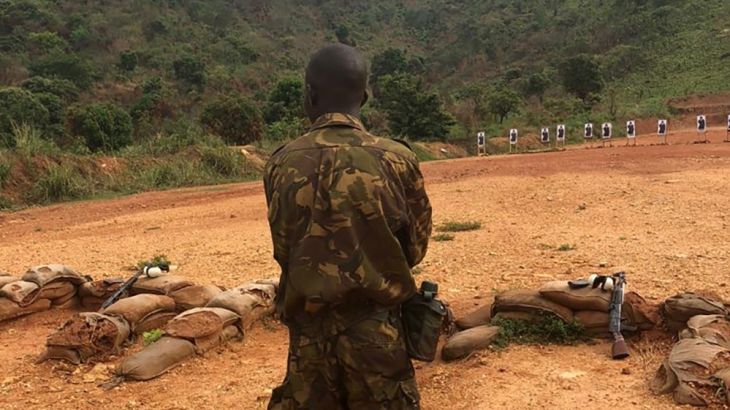Central African Republic: A crisis forgotten by everyone, except Russia
While the West remains complacent and aloof towards the humanitarian crisis, Russia steps in.

There is something deeply unsettling about seeing a white man posing for pictures, surrounded by young African children calling for help, in the 21st century.
Last year, I covered the visit of UN Secretary-General Antonio Guterres to the Central African Republic (CAR). This year, we followed Jan Egeland from the Norwegian Refugee Council.
Keep reading
list of 4 itemsEurope pledges to boost aid to Sudan on unwelcome war anniversary
Birth, death, escape: Three women’s struggle through Sudan’s war
Does Israel twist humanitarian law to justify Gaza carnage?
One called the CAR a forgotten conflict, the other a neglected one. Both visits were about pretty much the same thing: drawing attention to a country largely ignored by the international community spiralling into sectarian violence and on the verge of a humanitarian conflict in need of more help.
These calls for help had in most part fallen on deaf ears. Promises made were broken.
The United Nations said it needs nearly $516m to help the 2.5 million people in CAR. So far, it has received a fraction of that amount, about $123m. What this means in practice is that people are going hungry. Security is deteriorating with armed groups continuing to fight, displacing people.
‘Bystanders’
On November 14, the UN Security Council is expected to vote on renewing the humanitarian and peacekeeping mandate of the UN mission in the country.
“The UN’s 12,000 troops have prevented the sectarian violence between Muslims and Christians from turning into a genocide,” says Najat Rochdy, CAR’s humanitarian coordinator.
But some diplomats and aid workers we spoke to accuse the UN peacekeepers of being mere bystanders to the conflict, with some even calling them “incompetent”.
In April, UN troops stormed the Muslim neighbourhood of PK5 in the capital, Bangui, to arrest a local rebel commander who called himself General Force.
Heavily armed UN troops in armoured vehicles with aerial intelligence were overpowered by young men in flip-flops with Ak47s. Nineteen died and hundreds were injured, mostly locals.
General Force was unscathed.
West, UN fail
France, the former colonial power, is now on the retreat. They intervened when Muslim Seleka fighters took over control of Bangui in 2013. But after some of the soldiers were accused of sexual abuse, they left.
I met girls as young as 13 who said they were raped by French soldiers meant to protect them. Human rights organisations accused some of the troops of filming girls forced to have sex with dogs.
These crimes remain unpunished.
A court in France dropped the charges, saying there isn’t enough evidence for prosecution. A lawyer in Bangui told me: “Imagine if African soldiers raped young children in Paris. Would the crimes remain unpunished?”
Since then, most of the French troops have gone. The ones left are UN peacekeepers and European soldiers in Bangui training a poorly equipped CAR army.
We saw UN and European troops on their day off, at the pool of the capital’s Ledger Hotel, playing volleyball, drinking beer and listening to Eurythmics, while ordinary people in the city suffered a major water crisis, struggling to find water to drink.
The situation in the rest of the country is catastrophic. Fourteen militia groups fuel sectarian violence, forcing 1.2 million people to flee in search of a safe place to live.
Russia steps in
The UN-backed African Union peace talks have so far failed to stop the fighting. As the West remained complacent and aloof, ignoring the CAR, Russia stepped in.
At the request of President Faustin-Archange Touadera, Russian military instructors, including former soldiers who fought in Syria and Ukraine, are now in the CAR, helping the government regain control of the country.
The Russians recently opened a clinic in the rebel-held town of Bria. More of their military advisors are expected in the coming months.
Russia is supporting peace talks organised by Sudan in Khartoum to try and get armed groups around the table with the elected government.
The Russians are here in the CAR. And you won’t see them at the pool of the Ledger Hotel, playing volleyball and drinking beer, or taking pictures with poor children.